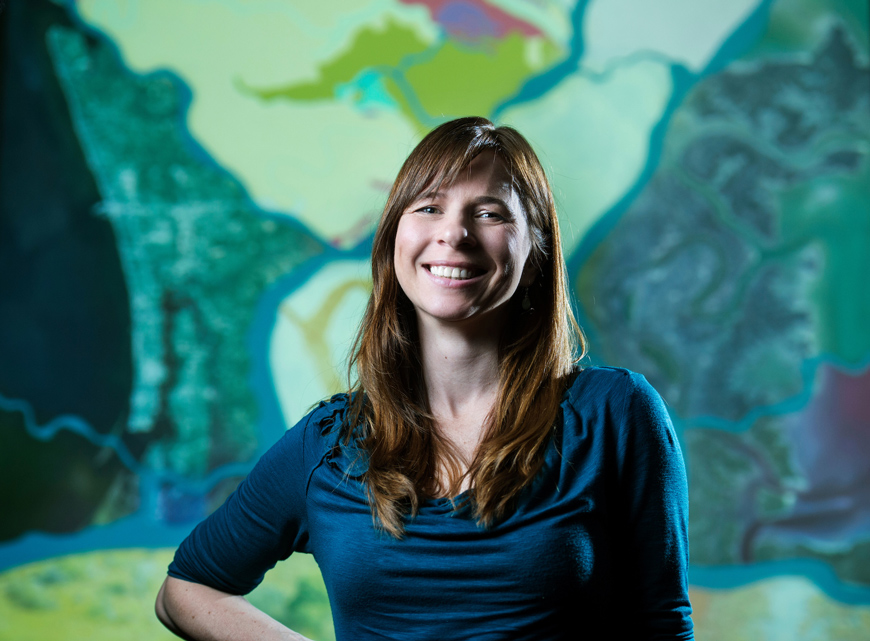The future of water: MSU researcher studies hydrology, ecology with practical applications for conservation
Contact: Allison Matthews
STARKVILLE, Miss.—Water. How can something so simple be so complex?
Researchers with expertise in a wide range of water-related issues will converge this month for the SEC Academic Conference to discuss the often complex issues related to the earth’s most life-giving resource.
Anna Linhoss, a Mississippi State assistant professor of agricultural and biological engineering and chair of the conference organizing committee, said she looks forward to meeting the best scientists in the Southeast and anticipates learning more about cutting-edge research from colleagues at other SEC universities.
“The Future of Water: Regional Collaboration on Shared Climate, Coastlines and Watersheds” is the theme of this year’s conference that will focus on research collaboration. Mississippi State University will host the March 27-28 event, and the new SEC Academic Conference is set to showcase SEC university research in areas of critical importance within the region and around the nation.

Linhoss’s own research focuses on hydrodynamic and water quality modeling, and her projects concentrate on areas such as the Gulf of Mexico and Florida’s Biscayne Bay. The University of Florida doctoral graduate said hydrodynamic modeling simulates the currents and movements of water. Linhoss earned a master’s degree at the University of Georgia and an undergraduate degree from the University of Colorado, Boulder. She joined MSU’s Department of Agricultural and Biological Engineering in 2013, and her work is part of the university's Mississippi Agricultural and Forestry Experiment Station.
Among her research projects is an examination of sand erosion from Deer Island, a barrier island that buffers Mississippi’s coastline. Her research team is utilizing cutting-edge sediment tracers to map the flow of currents and predict sand transportation. She is seeking practical methods to preserve the environment and save the state money on conservation costs.
“The reason we’re tracking sand movement is because we spend a lot of money putting sand back on beaches, and it’s getting washed away. And so if we can understand strategic ways and places to put that sand, then hopefully we can spend less money and less effort re-nourishing our beaches,” Linhoss explained.
She said hydrodynamic modeling has multiple applications and can help demonstrate not only the movements of water, but also can illustrate water factors like temperature and salinity.
This helps her study subjects like oysters, which declined significantly after the BP oil spill. Her research looks at biological and chemical characteristics of Mississippi’s Gulf Coast waters and simulates the environmental characteristics that oysters need to survive. She aims to help develop best practices to spur new oyster growth with the hope of seeing a resurgence in the state’s oyster population.
In Florida’s Biscayne Bay, she studies how water quality affects algal blooms and the resulting environmental impacts to the ecosystem.
“It affects the whole ecology of the system. You can actually have really big shifts in species composition because of these algal blooms, so that’s going to affect natural habitat, fisheries, and what the water looks like,” she said. “We’re trying to understand the impacts.”
Linhoss said more than 60 academic and governmental researchers will participate in this month’s conference as speakers and panelists. Governmental organizations, including the National Oceanic and Atmospheric Administration, U.S. Department of Agriculture, U.S. Geological Survey, and Environmental Protection Agency, also will be represented, among others, including Mississippi’s Delta Council.
Headlined by best-selling author John M. Barry, former National Geographic executive environment editor Dennis Dimick, and NASA Jet Propulsion Laboratory senior water scientist Jay Famiglietti, the event is expected to engage experts on a variety of water resource topics.
For complete conference details and registration, visit http://www.secconference.msstate.edu/.